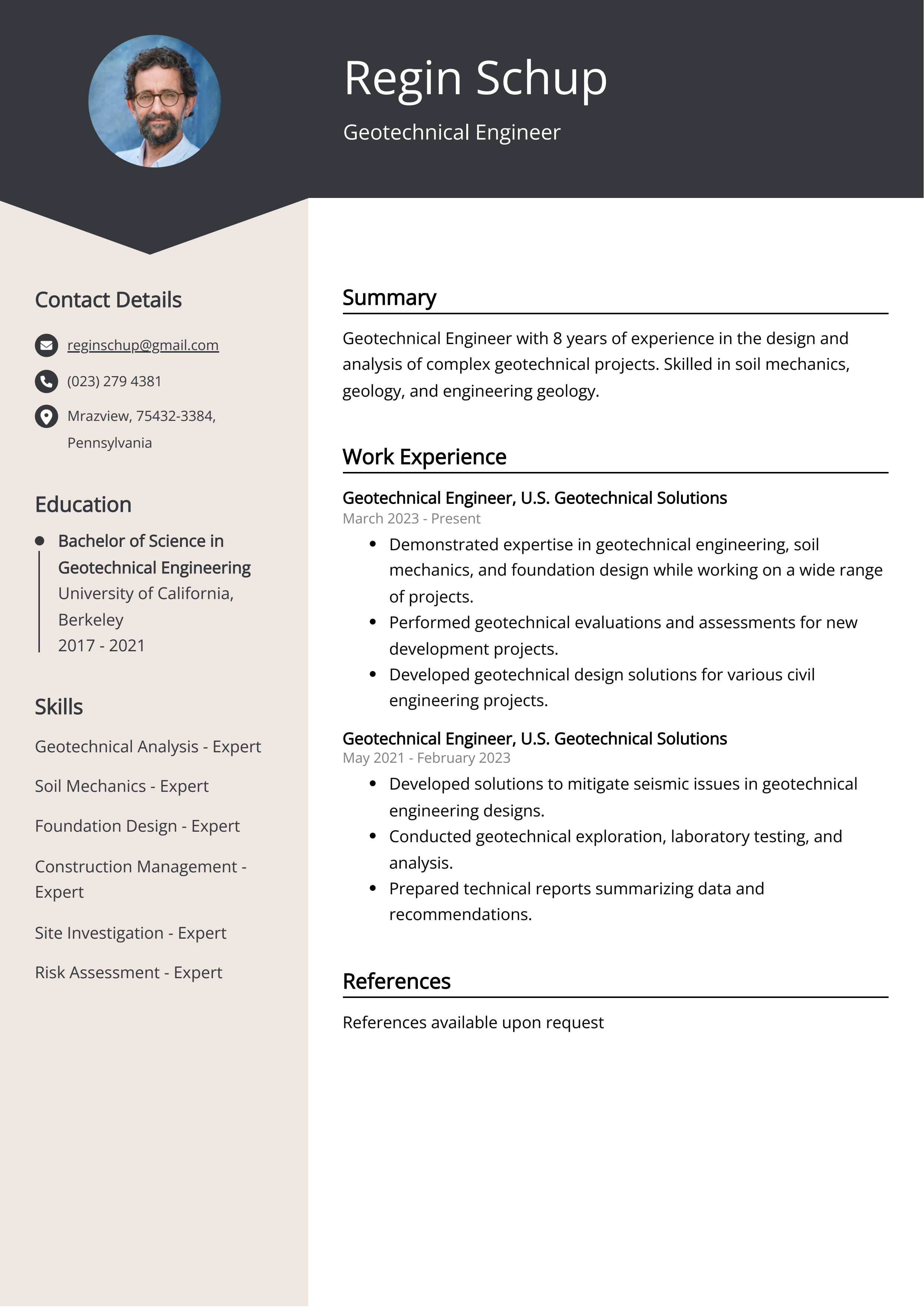The Geotheta PDFs
Our Geotheta Ideas
Table of ContentsRumored Buzz on GeothetaWhat Does Geotheta Mean?The 8-Minute Rule for GeothetaThe 30-Second Trick For GeothetaGeotheta Can Be Fun For Anyone

They perform website investigations, gather examples, execute laboratory tests, and evaluate data to review the viability of the ground for building tasks - Engineer of Record. Based on their findings, geotechnical engineers supply referrals for foundation design, slope security, retaining structures, and mitigation of geotechnical dangers. They team up with various other professionals, such as architects, structural engineers, and building teams, to guarantee that geotechnical considerations are integrated into the general job layout and execution
By assessing the behavior and homes of dirt and rock, they can identify potential geotechnical threats such as landslides, dirt negotiation, or incline instability. Their proficiency assists protect against failings or crashes that might threaten lives and property. Below are some thorough obligations and responsibilities of a geotechnical designer: Website Examination: Geotechnical engineers conduct site examinations to collect data on subsurface conditions.
They translate the information to recognize the residential or commercial properties and habits of the soil and rock, including their stamina, leaks in the structure, compaction attributes, and groundwater problems. Geotechnical Evaluation and Design: Geotechnical engineers assess the information accumulated during site investigations to evaluate the stability and suitability of the website for building jobs. They execute geotechnical calculations and modeling to examine elements such as bearing capability, settlement, slope security, side planet stress, and groundwater circulation.
The Greatest Guide To Geotheta
Foundation Style: Geotechnical engineers play a vital role in making foundations that can securely support the intended framework. They evaluate the dirt problems and load demands to identify the appropriate structure type, such as superficial foundations (e.g., grounds), deep foundations (e.g (https://www.gaiaonline.com/profiles/geotheta/46779300/)., piles), or specialized techniques like soil renovation. They consider variables such as negotiation limits, birthing capacity, and soil-structure communication to create ideal foundation designs
They review construction plans, display website activities, and conduct area assessments to confirm that the design recommendations are adhered to. If unanticipated geotechnical problems arise, they analyze the scenario and supply recommendations for removal or changes to the design. Danger Assessment and Reduction: Geotechnical engineers analyze geotechnical dangers and risks connected with the job site, such as landslides, liquefaction, or dirt erosion.

Partnership and Communication: Geotechnical engineers function carefully with various other specialists associated with a project, such as engineers, structural designers, and building and construction groups. Effective interaction and cooperation are necessary to integrate geotechnical considerations right into the overall job design and building process. Geotechnical engineers supply technical competence, answer questions, and guarantee that geotechnical needs are satisfied.
What Does Geotheta Do?
Below are some sorts of geotechnical designers: Foundation Engineer: Foundation engineers specialize in creating and analyzing foundations for structures. They examine the dirt conditions, load demands, and website characteristics to figure out one of the most appropriate foundation kind and style, such as superficial structures, deep structures, or specialized techniques like pile foundations.
They examine the aspects affecting slope stability, such as soil homes, groundwater conditions, and incline geometry, and develop techniques to stop incline failings and minimize risks. Earthquake Engineer: Earthquake engineers the original source concentrate on evaluating and designing frameworks to stand up to seismic forces. They evaluate the seismic hazard of a website, review soil liquefaction capacity, and establish seismic style criteria to guarantee the safety and durability of structures throughout earthquakes.
They execute area testing, collect samples, and assess the collected information to identify the dirt residential or commercial properties, geologic formations, and groundwater problems at a site. Geotechnical Instrumentation Engineer: Geotechnical instrumentation engineers concentrate on surveillance and measuring the habits of soil, rock, and frameworks. They set up and maintain instrumentation systems that keep an eye on elements such as soil negotiation, groundwater levels, incline motions, and structural variations to examine performance and provide very early warnings of possible problems.
Our Geotheta Ideas
They conduct examinations such as triaxial examinations, consolidation tests, direct shear examinations, and permeability examinations to collect data for geotechnical analysis and style. Geosynthetics Designer: Geosynthetics engineers specialize in the style and application of geosynthetic products, such as geotextiles, geogrids, and geomembranes. They use these materials to boost dirt security, reinforce inclines, provide drain remedies, and control disintegration.
They tend to be investigative individuals, which implies they're intellectual, introspective, and analytical. They are interested, systematic, sensible, logical, and sensible. Some of them are additionally social, suggesting they're kind, charitable, participating, individual, caring, handy, understanding, sensible, and pleasant - Geo Tech Engineer.
In the workplace atmosphere, geotechnical engineers utilize specialized software program tools to carry out computations, create designs, and assess information. They prepare reports, evaluation job specifications, interact with customers and employee, and coordinate job activities. The workplace setup supplies a favorable environment for study, analysis, and partnership with other specialists associated with the project.
10 Simple Techniques For Geotheta
They often visit job sites to carry out site investigations, assess geotechnical problems, and collect data for evaluation. These check outs entail traveling to various locations, in some cases in remote or tough terrains. Geotechnical designers might carry out dirt sampling, conduct tests, and display construction tasks to guarantee that the geotechnical facets of the project are being executed correctly.
Geotechnical engineers additionally work in specialized geotechnical labs. In these centers, they conduct experiments, carry out examinations on dirt and rock samples, and assess the design residential or commercial properties of the materials. Geotechnical research laboratory engineers function thoroughly in these settings, dealing with testing devices, running tools, and tape-recording data. They team up with various other laboratory personnel to make sure exact and reputable screening outcomes.